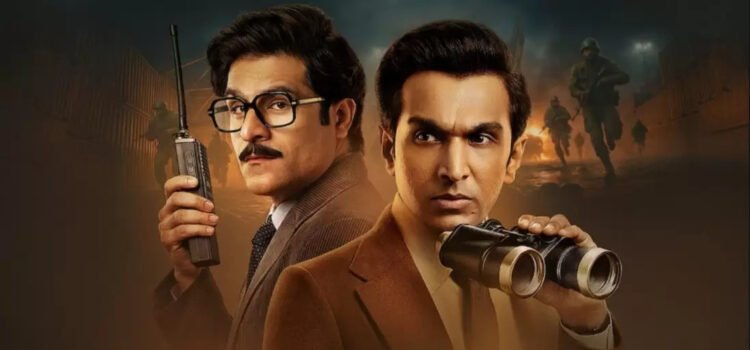Netflix’s newest spy thriller, Saare Jahan Se Accha, directed by Sumit Purohit arrived on the platform on Wednesday and thrust audiences straight into a heart‑racing blend of espionage, patriotism, and danger. The show is led by Pratik Gandhi, Sunny Hinduja, and Suhail Nayyar, and it places the hidden agents of RAW—men and women whose names never make the news yet whose deeds reshape history—under the spotlight.
Story
Set in the early 1970s, the drama unfolds during RAW’s formative years, when RN Kao (Rajat Kapoor) was appointed chief by Indira Gandhi’s government. Charged with a perilous assignment deep inside hostile territory, Kao selects his top operative, Vishnu Shankar (Pratik Gandhi), to infiltrate Pakistan under diplomatic cover.
Officially posted to the Indian embassy in Islamabad, Vishnu’s real mission is far more hazardous—stopping Pakistan from becoming a nuclear power. Accompanying him is his newly‑wed wife (Tilotama Shome), who believes she has married a diplomat; as days in Pakistan pass, she gradually uncovers the hazardous truth behind his job. On the ground, Vishnu links up with Indian assets already embedded in the country, including Sukhbir (Suhail Nayyar), a veteran spy who has spent years masquerading as a trading broker and who has cultivated a close relationship with a Pakistani army officer.
Across the border, senior ISI officer Murtuza works to secure a nuclear deal for Pakistan. His confidant and almost‑brother, Naushad Ahmed (Anup Soni)—a high‑ranking officer in the Pakistan Army—secretly assists RAW, endangering his own life. A Pakistani journalist (Kritika Kamra) also joins the clandestine effort, betraying her nation’s ambitions to help India keep Pakistan from acquiring nuclear weapons.
Performances
Pratik Gandhi excels as the undercover Indian operative, effortlessly shifting from a desk‑bound techie to a formidable field agent; his performance is simply spectacular. Sunny Hinduja captures the character’s nuances, speech patterns, and mannerisms perfectly, portraying an unstoppable force who can be both menacing and tearful when it comes to his loved ones or his country.
Anup Soni delivers a top‑tier portrayal of a Pakistani army officer; a particular scene featuring him and Sunny Hinduja stands out as one of the series’ most powerful moments, rivaled only by the finale involving Suhail Nayyar’s character. Suhail Nayyar shines as a reluctant Indian mole operating in Pakistan; his subplot holds the audience’s interest throughout the series.
Tilotama Shome gives a competent performance, but the writing for her character falters. Her sudden turn into a jealous spouse feels inconsistent, especially after earlier scenes where she confronts her husband about his true occupation, leaving her arc confusing.
Kritika Kamra receives limited screen time and her storyline ends abruptly; nevertheless, she remains naturally convincing in every brief appearance. Rajat Kapoor, as the head of RAW, is as reliable and compelling as ever, and supporting actors such as Hemant Kher add solid depth to the ensemble.
Behind the scenes
The script, penned by Abhijeet Khuman, Kunal Kushwah, Bhavesh Mandalia, Ishraq Shah, Shivam Shankar, Gaurav Shukla, and Meghna Srivastava, suffers from having too many cooks in the kitchen, which ultimately spoils the broth. While the first three episodes feel compact and engaging, the later half of the six‑part series lets the writing slip, losing momentum by the fifth episode and rendering the finale overly predictable.
Composer Ketan Sodha provides a score that adds intimacy and emotional weight to the grounded scenes while delivering the requisite grandeur for the more epic moments. Cinematography by Jay Patel, Debojeet Ray, and Dymtro Nedria is outstanding, bolstered by meticulous production design and period‑accurate costumes that recreate the 1970s with flair. The action sequences, though, could have benefitted from greater urgency and inventiveness.
Final Verdict
Overall, the writing shines in portions, the characters are well‑drawn, but the series loses its direction after a certain point. It begins strongly, outlining the circumstances that led to RAW’s formation and presenting Vishnu’s challenges without idolizing him, but it eventually veers off course and loses steam. The narrative feels most compelling when it offers a grounded, morally ambiguous portrait of its protagonists rather than when it leans into grandiose set‑pieces.
In the final stretch, several subplots remain unresolved—a fitting reflection of the open‑ended nature of spy work, where closure is rare. The mission succeeds, the story raises a glass to its unsung heroes, yet an indefinable something feels amiss. The series occasionally over‑dramatises real events for cinematic effect, especially in the later episodes, which tilt toward a conventional patriotic thriller rather than the nuanced espionage drama it promised. Though far from flawless and in need of tighter consistency, Saare Jahan Se Accha brings a welcome dose of realism to the spy‑genre.
In short, the show starts on a strong footing but lacks a clear, sustained perspective. It is an above‑average offering that could have made a bigger impact with a steadier hand.























